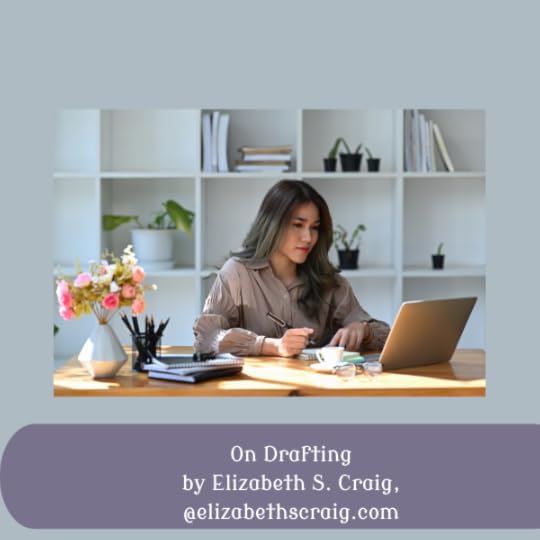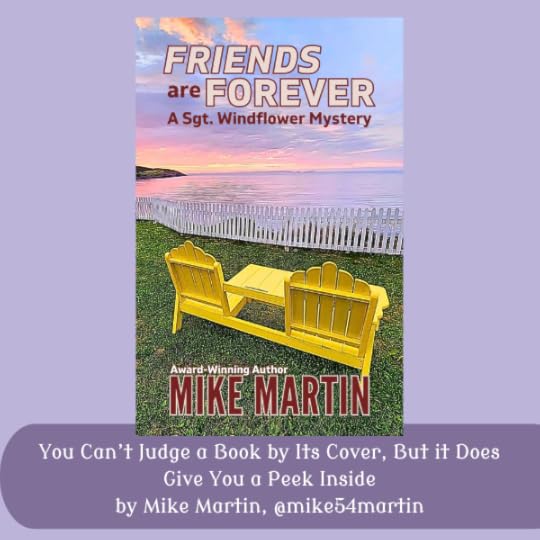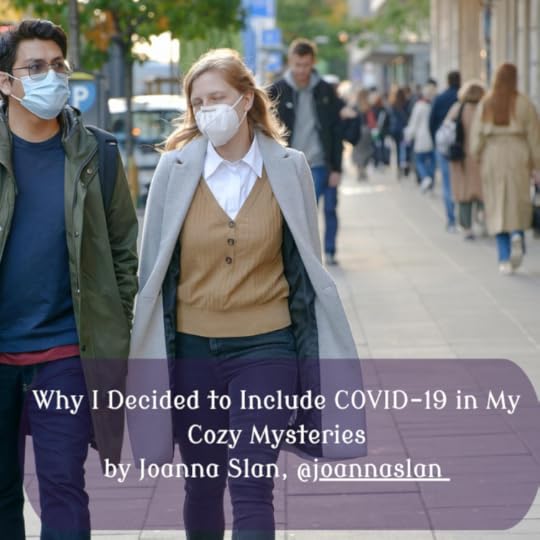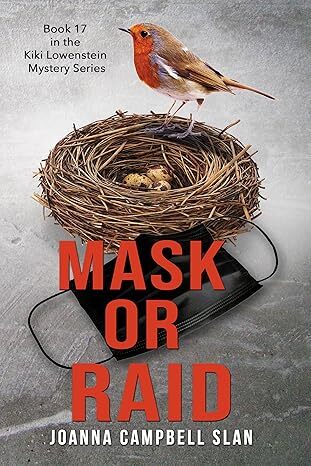Riley Adams's Blog, page 5
May 31, 2025
LitLinks

by Elizabeth S. Craig, @elizabethscraig
LitLinks are fed into the Writer’s Knowledge Base search engine (developed by writer and software engineer Mike Fleming) which has over 70,000 free articles on writing related topics. It’s the search engine for writers. While you’re there, check out the Writer’s Digest award-winning Hiveword novel organizer.
Have you visited the WKB lately? Check out the new redesign where you can browse by category, and sign up for free writing articles, on topics you choose, delivered to your email inbox! Sign up for the Hiveword newsletter here. Follow the WKB on Facebook here.
Lessons Learned from Six Years of Writing Full-Time: by Sacha BlackBusiness Musings: Putting Yourself Out There: by Kristine Kathryn RuschMaking Beautiful Things: By Kristin Hacken South7 ways to boost your creativity: by Daphne Gray-Grant7 Books About Long-Lost Sisters: by Morgan Dick7 Books That Turn Social Media Into a Plot Twist: by Liann ZhangCrime Fiction: In The Spotlight: Carlene O’Connor’s Some of Us Are Looking: @mkinberg.bsky.socialEmerging From Writer’s Block: by Andrea GriggWhy Finishing Your First Draft Feels Impossible: by April DávilaHow To Keep a Journal (Without the Tedium): by Ruth O’NeilTraits You’ll Need to Succeed as a Writer: by Suzanne LieuranceA life full of creative fire – novelist Jill Amber Chafin: by @rozmorris.bsky.socialLife as a WIP: By Nancie AbuhaidarHow Well Do You Sleep, Writers? by Sue ColettaThree Things I Didn’t Know About Being a Published Author: By Terah Shelton HarrisReimagining Your Competitors as Collaborators: by Hanna Kjeldbjerg @janefriedman.comDoes Grief Transform What you Write? By Sweta VikramObstacles, Overwhelm, and the Oracle of Alex: by Foxprint EditorialBringing Necromancy to Life in Your Story: by Chris WinkleUsing Transforming Weapons: by Charles Yallowitz7 Tips to Writing Transforming Weapons: by Charles YallowitzCalling in Experts as an Element of Crime Fiction: @mkinberg.bsky.social7 Iconic Women Detectives in Historical Mystery Novels: By Shaina SteinbergWhy the World of Influencers Is Perfect for a Mystery: By Liann ZhangChildren’s Writing: Story, Plot, and Arcs: by Karen CioffiNailing the Landing—Endings to Poems: by Shutta CrumHow do Amazon ads work for books? by Penny SansevieriMass Market Paperbacks, RIP: by James Scott BellHow to Query Agents: A No-Nonsense Guide for First-Time Authors: from the Story GridBuild These Seven Growth Milestones into Your Character’s Arc: by Becca PuglisiWhat Does a Developmental Editor Do? GPS and Map View: from Fox Print EditorialWhat Makes People (and Characters) Interesting? By Sarah CallenderA Dialogue Writing Exercise: by @philathans.bsky.socialBalancing Heavy Topics with Humor: By CL Montblanc at the IWSGThree-Act Analysis of The Hunger Games: by Gabriela PereiraIn Praise of the Dark and Innovative Genre-Bending of Twin Peaks: By Lauren HaddadWorst Wingman Ever Novel Beat Sheet Analysis: by Marilyn Brant10 Brutal Writing Lessons You Wish You’ll Learned Sooner: by Lucy V HayIn Medias Res: Definition and Writing Examples: by Polly WattCharacters With Nothing to Do: from MythcreantsMetaphor: The Key to a Great Title: by Tommy DeanThe Most Dangerous Arc: Breaking Down the Corruption Character Arc: by KM WeilandHow to Write a Comic Script: by Tim SusmanHow to Write in Third Person: 6 Tips: by Brandi BadgettAvoid These Common Book Title Mistakes That Can Tank Your Sales: by Penny SansevieriBuilding Your Scenes with Beats: by CS LakinPunctuation : Ellipsis: by D. Wallace PeachMaking the Most of Your Beta Reads: by Travis TougawYour Setting: Make It Come Alive: by Karen CioffiIs Your Worldbuilding TOO Powerful? by Janet ForbesBeyond the Accent: Writing Speech Patterns Authentically: by Elle Jauffret @JaneFriedman.comTrigger Questions: The Worldbuilding Game-Changer: by Jaime Buckley
The Top Writing Links From Last Week Are On LitLinks:
Share on X
The post LitLinks appeared first on Elizabeth Spann Craig.
May 24, 2025
LitLinks

by Elizabeth S. Craig, @elizabethscraig
LitLinks are fed into the Writer’s Knowledge Base search engine (developed by writer and software engineer Mike Fleming) which has over 70,000 free articles on writing related topics. It’s the search engine for writers. While you’re there, check out the Writer’s Digest award-winning Hiveword novel organizer.
Have you visited the WKB lately? Check out the new redesign where you can browse by category, and sign up for free writing articles, on topics you choose, delivered to your email inbox! Sign up for the Hiveword newsletter here. Follow the WKB on Facebook here.
In Wales, Yasmin Zaher Wins the £20,000 Dylan Thomas Prize: by Porter AndersonTorino’s Fair Draws 231,000 Attendees, 977 Stands: by Porter AndersonThe £50,000 International Booker Prize Winner: ‘Heart Lamp’: by Porter AndersonInspiration: 4 Emotional Corners: by Krista PuttlerFive Novels About Coming of Age When You’re Old Enough to Know Better: By Emily EverettCrime Fiction: In The Spotlight: Paul Pilkington’s Long Gone: @mkinberg.bsky.social7 Novels Set In Supernatural Hotels: By Molly Odintz7 Books That Turn the Workplace Into a Nightmare: by Sarah Maria Griffin8 Irish Novels About the Rise and Fall of Big Houses: by Louise Hegarty11 writing motivation hacks: by Daphne Gray-GrantTry Using a Writing Prop for Writer’s Block: by Laura Yeager5 Ways To Tell If Your Manuscript Is Ready: By K.M. AllanYour wake up time doesn’t matter: by Daphne Gray-GrantBad Advice Writers Get From Unhelpful Friends: by Anne R. AllenWriting a Story vs Watching a Sporting Event In-Person: by Charles E. YallowitzThe War of Attention: By Barbara O’NealWriting With Four Hands: Anne and Claire Berest on Writing a Novel Together as Sisters: Why Write Fiction? By Emilie-Noelle ProvostManage Your To-Do List with Todoist: by Saya Hillman @janefriedman.comNone of Your Business: Why Writers Shouldn’t Feel Obligated to Share Too Much: By Debbie UrbanskiWriting Through the Hardest Scenes: 5 Techniques to Stay Confident: by April DávilaThings I wish I’d known as a baby writer: by chaoschaoswritingHow Do You Balance Creativity and Career? from Fox Print EditorialBalancing Protective Characters in Your Cozy Mystery: Why We Turn to Detective Fiction in Times of Upheaval: by Louise HegartyEverything You Need To Know To Write A Thriller: byHank Phillippi RyanUnreliable Recollections as an Element in Crime Fiction: @mkinberg.bsky.socialThe Clues, the Clueless, and the Critics: Appreciating Clue: by Olivia RutiglianoCommon Children’s Writing Mistakes: by Karen CioffiRealistic or Bogus? I’ve Judged Six Sci-Fi Ships: by Oren AshkenaziAuthors Talk About Their Worst Reviews: compiled by Jan SikesHow (and Why) To Define a Strong Author Brand: by Jenny HansenWhat’s A Writer to Do NOW With Social Media? by Edie MelsonWordPress Themes: Something Exciting Is Happening: by Hugh RobertsHow to Get Your Book Published With a Small Press: by Carol L. Pauer @natalieaguirre7.bsky.socialThe Demands of, and Demand for, Print on Demand: by Arpita DasAAP StatShot: The Overall US Market Rises 7.3 Percent in March: by Porter AndersonOn Reported Moscow Arrests: ‘The Risks Publishers Now Face in Russia’: by Porter AndersonIn Brussels, a Call for Proper AI Act Implementation: by Porter AndersonDo You Really Want to Get to Know the Villain? By Natalie HartVillains vs. Antagonists: by Debbie BurkeCharacter Occupations: by Liz GauffreauCharacter Secret Thesaurus: Living Under a Curse: by Becca PuglisiCharacter Secret Thesaurus: Giving Up a Child: by Becca PuglisiSix Things I Learned Watching Outlander: By Valerie TaylorFive Tips on Writing for the Second Read: by Chris WinklePlot Devices: by Margot ConorThe Inside Story of Character Reactions: By Julie DuffyTips for Writing With Heart: by Dale Ivan SmithPlaying to Your Audience: by Pat Hatt at the IWSGHow to Turn Pinterest Boards Into Novels: by Shannon A. Thompson6 Tips for Creating Chemistry Between Characters: by Becca PuglisiCreating Emotional Resonance: by Marilynn ByerlyWriting: Revising Novel Structure: by Linda S. ClareConjuring Images when Writing for Comics, Prose, and the Screen: by Jessica MaisonDo You Write Women’s Fiction or Men’s Fiction? by Mara PurlWhat About Structure? by Terry OdellAdolescence Full Season Beat Sheet Analysis: by Shari SimpsonThe Oxford (Series) Comma: By Arlene MillerMore Than Setting: Centering Nature in Your Fiction: by Erin Radniecki @janefriedman.comHow to Use AI to Support Your Writing: by Rochelle Melander
The Top Writing Links From Last Week Are On LitLinks:
Share on X
The post LitLinks appeared first on Elizabeth Spann Craig.
May 18, 2025
Balancing Protective Characters in Your Cozy Mystery
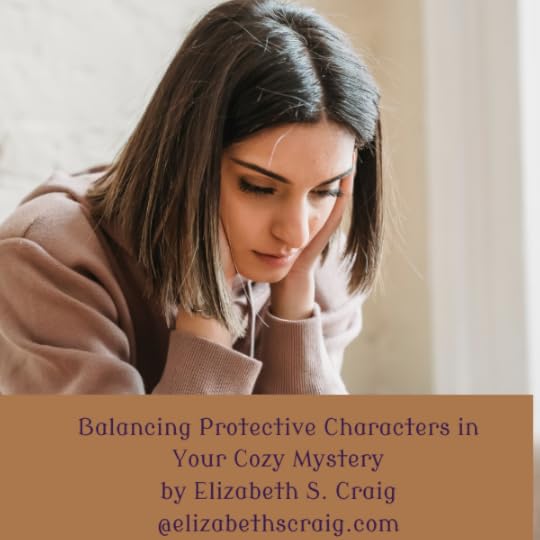
by Elizabeth S. Craig
If you’ve written cozy mysteries (or read them) for any length of time, you’ve probably encountered this common character dynamic: your amateur sleuth is busily investigating a murder while someone close to them—a spouse, romantic interest, parent, or friend—is desperately trying to keep them out of danger.
This protective figure is practically a cozy mystery staple, and with good reason. They create tension, provide realistic opposition to the sleuth’s sometimes risky behavior, and often serve as a sounding board for theories. But they can also become problematic if not handled with care.
I’ve discovered a few approaches that keep these protective characters from becoming either irrelevant speed bumps or overbearing dream-killers for our determined sleuths.
The Worrier’s Valid PerspectiveFirst, let’s acknowledge something important: the protective character is usually right. Amateur sleuths do put themselves in danger, and from the perspective of a loving spouse or concerned parent, investigating a murder is absolutely something to discourage.
I try to let these protective characters occasionally voice what the reader might be thinking: “Why not just call the cops instead of checking that dark basement yourself?”
Finding the Sweet Spot Between Overbearing and ObliviousThe challenge comes in balancing the protective character’s role. Too protective, and they become an annoying hindrance that readers resent. Not protective enough, and their concern feels performative instead of genuine.
Here are some ideas for the right balance for protective characters:
Express legitimate concerns but don’t constantly repeat themOccasionally help the investigation in limited, cautious waysHave their own storylines beyond just worrying about the protagonistShow grudging respect for the sleuth’s abilities while maintaining concernCreative Solutions for the Protective DynamicRather than having the same “please be careful/I’ll be fine” conversation repeatedly, try these approaches to keep the relationship fresh:
Specific rather than general concerns: Instead of general worrying, have the protective character point out specific risks about particular suspects or situations.
Conditional support: “If you’re going to question the gardener anyway, at least let me drive you there and wait outside.”
Information exchanges: The sleuth shares discoveries with the protective character in exchange for less interference.
Earned trust: Let the protective character’s confidence in the sleuth grow based on past successes, even while their worry remains.
Specialized assistance: Give the protective character a specific way they contribute to investigations that allows them to help while still expressing caution.
When the Sleuth Actually Needs ProtectionDon’t forget that sometimes your sleuth genuinely needs that protection. Having your protagonist occasionally get into trouble proves the worrier right and adds credibility to their concerns.
What protective dynamics have you included in your mysteries? Have you noticed this pattern as a reader?
[bctt tweet=”Writing a cozy mystery with a protective spouse, parent, or friend who’s always warning your sleuth about danger:
The post Balancing Protective Characters in Your Cozy Mystery appeared first on Elizabeth Spann Craig.
May 17, 2025
LitLinks

by Elizabeth S. Craig, @elizabethscraig
LitLinks are fed into the Writer’s Knowledge Base search engine (developed by writer and software engineer Mike Fleming) which has over 70,000 free articles on writing related topics. It’s the search engine for writers. While you’re there, check out the Writer’s Digest award-winning Hiveword novel organizer.
Have you visited the WKB lately? Check out the new redesign where you can browse by category, and sign up for free writing articles, on topics you choose, delivered to your email inbox! Sign up for the Hiveword newsletter here. Follow the WKB on Facebook here.
How To Work With A Book Illustrator: by Elaine Dodge3 Ways to Bulletproof Your Author Career (and 1 to avoid): by Seth RingWill You Read From Your Book, Please? By John Gilstrap10 Novels Exploring Complicated Feelings About Ambition: by Emma Pattee7 Campus Novels That Break the Mold: by Sanibel10 Mysteries Set in the Bleak Midwinter: by Bailey SeyboltThe Real Mean Girls of Classic Literature: By Sanibel8 Funny Novels That Make Light of the Writer’s Plight: by Ashley WhitakerWhat’s Your Writing Spark? by D.L. FinnHow to Get Your Second Book Ready for Publication: by Author Leah Stecher @natalieaguirre7.bsky.socialSeven Writing Fears That May Be Holding You Back from Greatness: by Eleanor HecksWhy writers need checklists: by Daphne Gray-Grant“We’re Going to Have to Let You Go”—Firing a Writing Project: By Lee UptonSpending Seven Years Writing a Novel: A Study in Madness or Determination? by Liz AltermaUsing AI in Your Writing: from Fox Print EditorialTiny Writing Experiments: by Anne Janzer10 Types of Magic in Fantasy and Sci-Fi: by Polly WattHorror Writing and Anxiety: by C.C. WinchesterTaking Humor Writing Seriously: by Ira NaymanConstructing a Fictional Serial Killer: By Omar HussainAddressing Difficult Topics With Kids in Crime Fiction Novels: @mkinberg.bsky.socialAvoid this problem when writing a mystery: by @rozmorris.bsky.socialDysfunctional Mentoring Relationships in Crime Fiction: @mkinberg.bsky.socialLay the Professional Groundwork for a Successful Nonfiction Book: by Jennifer DorseyHow to write a non-fiction book with Sally Cronin: 10 Story Prompts for Romance Writers: by Kayelle Allen7 Tips to Adding Romance to a Non-Romance Story: by Charles Yallowitz6 Book Marketing Tips for New Authors: by Anne R. AllenYou Get What You Pay For With Book Publicity: by Julie Schoerke at the IWSG5 Ways Fear is Quietly Sabotaging Your Book Marketing: by Colleen M. StoryDon’t Wait to Build Your Author Platform: by April DávilaDon’t be too quick to listen to agents: by Daphne Gray-GrantTwo to Avoid: Book Order Scams and Fake Reviews: by @victoriastrauss.bsky.socialFirst Page Critique: Get Quinn Moving And Out Into That Snow! by PJ ParrishThe Maiden Archetype: by Polly WattCharacter Secret Thesaurus: Hiding the Truth about Family: by Becca PuglisiCreating Conflict in Stories: How Antagonism Transforms Your Narrative: by StoryGridDrafting: The Problem With Retroactively Justifying Character Choices: by Oren AshkenaziCan Placeholders Cause Problems? by Oren AshkenaziShould You Use Profanity in Your Writing? by Joy YorkSidekick Protagonists: from Mythcreants5 Red Flags Your Novel Might Be Too Much Work to Read: by Janice HardyCinematic Technique for Fiction Writers: by CS LakinA Peek Inside the Mind of a Developmental Editor: by Jenn WindrowWho Is Telling This Story—and When? Creative (and Purposeful) Uses of “Person” and “Tense”: By Barbara Linn ProbstCommonly Confused Words [That I Keep Seeing Online]: from Hey, WritersWriting: Mapping Your Scenes: by Linda S. ClareColors – How they can enhance our settings and characters: by Jan SikesThe Power of Psychological Tension: by Margot ConorUnderstanding Tropes and Genre Conventions: by Gabriela PereiraArguing with AI (About My Novel): By Yuvi ZalkowThesaurus Love: by James Scott Bell
The Top Writing Links From Last Week Are On LitLinks:
Share on X
The post LitLinks appeared first on Elizabeth Spann Craig.
May 11, 2025
Drafting
I think drafting is one of those processes we have to make our own, often through trial and error. There are a few of those when you’re a writer: whether to outline or not, how to develop characters, and whether you edit afterward or as you go. There are never any right or wrong answers, only what works best for you.
I had a writer reach out to me, asking what my drafting process is. I think sometimes we want to just get a little validation that our approach is a good one. This writer asked how many drafts I usually have before I declare my project done.
That answer has changed through the years as my process has become more cemented. When I was starting out in the early 2000s, I would change a completed manuscript numerous times, trying to get it the way I wanted it. This led, eventually, to knowing what I wanted from a manuscript before I started.
For me anyway, stumbling through multiple drafts helped me work out some plot details before starting the book. This led to mini-outlines, which helped me determine what I was going to write the next day.
This led to my developing a full outline at the start of the project. Which led to fewer drafts altogether.
So now, I basically go through three drafts with 3 total passes through the whole book. The first draft is me getting it all down on paper from start to finish. The second draft is often where I have to add in non-mystery-related elements (often descriptions of people and settings). The third draft is where I fix mechanical and consistency issues and add chapter breaks.
After that, the manuscript goes to my editor and beta readers. There will be more changes to the manuscript after that, of course. Then I’m done.
But I’m interested in hearing what your process is and how it’s been honed through the years. What does your drafting look like?
Every writer's drafting process is unique. From countless revisions to a streamlined three-draft system, discover how one author's approach evolved over time::
Share on X
The post Drafting appeared first on Elizabeth Spann Craig.
May 10, 2025
LitLinks

by Elizabeth S. Craig, @elizabethscraig
LitLinks are fed into the Writer’s Knowledge Base search engine (developed by writer and software engineer Mike Fleming) which has over 70,000 free articles on writing related topics. It’s the search engine for writers. While you’re there, check out the Writer’s Digest award-winning Hiveword novel organizer.
Have you visited the WKB lately? Check out the new redesign where you can browse by category, and sign up for free writing articles, on topics you choose, delivered to your email inbox! Sign up for the Hiveword newsletter here. Follow the WKB on Facebook here.
Planning for the Life of Your Work (Even If You’re Not Famous Yet): by Charlotte Jones Voiklis @janefriedman.comSpitballing Story Ideas: by C.S. BoyackThe Unexpected in Your Writing: By Kathleen McClearyOn My Grandfather’s Novel: F. Scott Fitzgerald’s The Great Gatsby at 100: by Eleanor LanahanMaking writing too hard for yourself: by Daphne Gray-GrantNumbers game for writers: from Daphne Gray-GrantA (Mostly) Clean Challenge: Writing a Novel with Minimal Profanity: by Linda K SienkiewiczQuick Tips to Spring Clean Your Writing Nook: by Colleen M. Story10 Themes for Fiction Set in Spring: by Jessica StrawserTrust Your Instincts: Why Writing for Yourself Leads to Better Books: by Laura Stanfill @janefriedman.com5 Ways Writing a Book Will Help You to Unlock Your Hidden Creative Genius: by Rebecca CamarenaCreate the Career You Want: from Fox Print EditorialPortrait of ChatGPT as a Young Artist: Vauhini Vara on Voice, Tech, and Using AI in Writing: by Sarah VirenMaking Time for Quiet Contemplation: by April DávilaWriting a Memoir: 6 Crucial Lessons: by Catherine McCallThe Secret to Avoiding a Sagging Memoir Middle: by Lisa Cooper EllisonQuebec as a Setting in Crime Fiction: @mkinberg.bsky.socialCrime Fiction: In The Spotlight: Susie Black’s The Case of the Croaked Coach: @mkinberg.bsky.socialMeandering in the Middle of a Poem—What to Do? by Shutta Crum7 Common Blogging Mistakes and How to Avoid Them for a Successful Blog: by Hugh RobertsWhat’s Your Brand? by Kay DiBiancaBuild Your Author Platform by Leveraging Organizational Relationships: by Lisa TenorShould Authors Quit Social Media? by Sue ColettaNovelettes: Worth the Time and Effort? by Ann GordonYou Can’t Judge a Book by Its Cover, But it Does Give You a Peek Inside: by Mike MartinMy Twenty-Four Hour Dream: by Denise Beck-ClarkCharacter Secret Thesaurus: Fleeing a Crime Scene: by Becca PuglisiWriting Unforgettable Characters: by Tammy L. GraceWill Readers Dislike My Bad Guy Turned Good? by Oren AshkenaziThe Importance of Flaws in Our Characters: by Beem WeeksSpotlight the Effect of Your Characters’ Energy: By Kathryn CraftFive Ways to Get Your Protagonist to Realize They’re the Problem: by Marissa Graff3 Common Mistakes Writers Make with Conflict: by Janice HardyUsing a Character’s Personality Traits to Generate Conflict: by Angela AckermanCan AI Be Funny? by Debbie BurkeHooking the Reader: by Dale Ivan SmithCenter Your Darlings: from MythcreantsWhy Readers Abandon Books (And How to Make Sure They Don’t): from Story Grid10 Writing Strategies: by Polly Watt3 Important Wake Up Calls For Screenwriters And Authors: from Bang2writeWriting: Test Your Novel Structure: by Linda S. ClareHere’s what readers really hate: By Elaine VietsRun on Sentence: Definition and How to Fix Them: by Millie DinsdaleThe Power of Unspoken Words: How to Write Subtext in Fiction: by K.M. WeilandButt in the Chair: How Disability Changed My Writing Habits: by Catherine Tavares
The Top Writing Links From Last Week Are On LitLinks:
Share on X
The post LitLinks appeared first on Elizabeth Spann Craig.
May 4, 2025
You Can’t Judge a Book by Its Cover, But it Does Give You a Peek Inside
by Mike Martin, @mike54martin
With the publication of Friends are Forever there are now 16 books in the Sgt. Windflower Mystery series. I know that sounds like a lot, but the series started in 2012. The old writer’s joke is: How do you get to be an older, established writer? Keep writing and don’t die!
That means we have had to come up with 16 somewhat different covers that all fit within the general theme of what might be a Sgt. Windflower Mystery. And while you certainly can’t judge a book by its cover, it should give the reader a hint of what’s inside. Over that time we’ve done many different things. But everything we hope, has led readers back to Grand Bank and to that most beautiful corner of Canada. This has included ice bergs and boats and fishing stages and sheds. And lighthouses, of course. But the most touching covers, I believe have come from pictures. Particularly ones that we and our family have taken while visiting Newfoundland.
We are fortunate indeed to be able to visit Newfoundland every year for most of the month of August. That means we get to enjoy the people and the scenery that make this place so special. And of course, we get to eat. A lot. Homemade raisin bread toast almost every morning. Fish every meal we can. Jiggs Dinner at the wonderful Garnish Bakeapple Festival. Cheesecake of all types, including Sgt. Windflower’s favourite chocolate peanut butter at Sharon’s Nook and Tea Room aka the Mug-Up.
To try and compensate for this orgy of eating we walk when we are in Newfoundland. A lot. We do hikes in Gros Morne National Park, to the shipwreck site in St. Lawrence and up to the top of the hill at Cook’s Lookout in Burin. Of course, we do tons of walking in Grand Bank. On the hiking trail up to the lookout and up to the Cape on every fine day. But some of the best walks are after supper when we and the dog try and stroll off some of the extra calories that we’ve consumed during the day.
It is also a calm and peaceful way to end another glorious day in Grand Bank. That is exactly what we were trying to show you in the cover for Friends are Forever. Looking out over the Atlantic Ocean as the sun slides away into the horizon. Wouldn’t you like to be there? You may not be able to get there right away but you can get a taste of what it might be like by reading the book.
A great cover should invite you in and in the case of a series welcome you to take a peek inside. So come in, sit down. You’re among friends again. We’re happy to see you.
Mike Martin is the author of the Award-Winning Sgt. Windflower Mystery series. The latest book is Friends are Forever. Available from Amazon and where all fine books are sold.
Book covers tell their own stories: by @mike54martin
Share on X
The post You Can’t Judge a Book by Its Cover, But it Does Give You a Peek Inside appeared first on Elizabeth Spann Craig.
May 3, 2025
LitLinks

by Elizabeth S. Craig, @elizabethscraig
LitLinks are fed into the Writer’s Knowledge Base search engine (developed by writer and software engineer Mike Fleming) which has over 70,000 free articles on writing related topics. It’s the search engine for writers. While you’re there, check out the Writer’s Digest award-winning Hiveword novel organizer.
Have you visited the WKB lately? Check out the new redesign where you can browse by category, and sign up for free writing articles, on topics you choose, delivered to your email inbox! Sign up for the Hiveword newsletter here. Follow the WKB on Facebook here.
Make Money Freelance Writing with a 7-Day Blitz: by Mridu Khullar RelphAI Made Me Want to Trademark My Name. Here’s How I Did It: by Teri Case @janefriedman.comWhat Will Your Writing Career Cost You? from Fox Print Editorial8 Graphic Novels Set in New York City: by Kay SohiniThe Limits of Memory: by Kristin Hacken SouthWhich Book Should I Write? by Lisa TenerYour Book Isn’t for Everyone: by Julie GloverWhy you should LET your mind wander: by Daphne Gray-GrantBuild a Writing Community that Feels Like Home: by Gabriela PereiraTake this Mini Yoga Break to Foster Creativity: by Laura K Roe5 Reasons To Say Yes To Your Book: by Elaine DodgeWriting While Traveling: by Linda S. ClareHow to Navigate the Publishing Industry with Social Anxiety: by Marie CrokeWhy Writers Need Affirmations in Their Success Toolkit: by Nina AmirYou Can’t Go Home Again: A Pantser Makes the Second-to-Last Move: by Barry KnisterWriting Historical Fantasy with Nicole Glover (Podcast): by Sacha BlackWhat, Why, How: Children’s Author Rebecca Weber celebrates neurodivergence: Why I Decided to Include COVID-19 in My Cozy Mysteries: by Joanna SlanMentoring Relationships in Crime Fiction: @mkinberg.bsky.socialCrime Fiction: In The Spotlight: Rod Reynolds’ Black Reed Bay: @mkinberg.bsky.socialTimely Yet Timeless: Crafting Nonfiction That Outlasts Current Events: by Nicole PopeThe Sound Effects of Poetry: Pure Sound: by Susanne BennettI Tried a BookBub Featured Deal—Here’s What Happened: by Colleen M. StoryHow to Budget for Your Book Launch: by Joel Pitney @janefriedman.comHave Your Book Sales Gone Stale? Try This: by Jean AlfieriGermany’s Nonfiction Prize Names Its 2025 Finalists: by Porter AndersonTommy Orange Wins the 2025 Aspen Words Literary Prize: by Porter AndersonWhat to Know About Interactive Storytelling? by Jacqui MurrayUpdate: A $250,000 Matching Grant for Iowa’s International Writing Program: by Porter AndersonAfter the Vote, Canada’s Book Business Raises Its Copyright Crisis: by Porter AndersonHow to Get a Book Published in 2025: Go-To Guide for Authors: by Dave ChessonThe Query: Be Specific: by Karen CioffiHow Writers Can Use the Four Stages of Knowing in Character Arcs: by K.M. WeilandCharacter Secret Thesaurus: Being an Anonymous Financial Donor: by Becca PuglisiFifteen Traits for a Lovable Hero: by Chris WinkleWriting 101: Dialogue Mechanics: by Becca PuglisiWhat Film Noir Can Teach Writers: by James Scott BellFive Ways to Include Collective Action in Your Story: by Chris WinkleHow Useful are James Patterson’s MasterClass Writing Tips? by Oren AshkenaziRiff Writing: A Path To Tuneful Prose: by Elizabeth LyonYes, You CAN Kill Your Female Characters (Just Not Like THIS): by Lucy V. HayEnergize Your Writing With 15 Key Techniques: by Ronald KovachThe Best Way to “Show, Don’t Tell” –Scene Segmenting: by CS LakinWriting Voice: Sentences that Sing: by Anne JanzerToo Many Subplots? by Bucket SilerCleaning Up Those POV Breaks: by Ann GriffinHow to Master Description in Fiction Writing: from Story Grid
The Top Writing Links From Last Week Are On LitLinks:
Share on X
The post LitLinks appeared first on Elizabeth Spann Craig.
April 27, 2025
Why I Decided to Include COVID-19 in My Cozy Mysteries
By Joanna Campbell Slan, @joannaslan
Writing Through the Pandemic:
Why I Decided to Include COVID-19 in My Cozy Mysteries
By Joanna Campbell Slan
When I began writing Mask or Raid: Book #17 in the Kiki Lowenstein Mystery Series, I faced a dilemma that many authors have grappled with since 2020: should I acknowledge the pandemic that had dramatically reshaped our world, or should I create an alternate reality where COVID-19 never happened? This wasn’t just a practical question about setting and timeline—it was a deeper consideration about the responsibility of fiction to reflect, process, and preserve our shared experiences.
A Personal Connection
My decision crystallized when my grandson was born in 2021, during the height of the pandemic. Looking at this new life entering such a changed world, I wondered: How will I ever explain to him what this extraordinary time was like? The fears we faced, the misinformation that spread almost as quickly as the virus itself, the political divisions that emerged, and the everyday heroism of ordinary people? I realized then that my writing could serve as a time capsule—not just for my grandson, but for all future readers who might wonder what living through this period was really like.
Why Cozy Mysteries Are the Perfect Vehicle
Cozy mysteries might seem like an unlikely genre for addressing a global pandemic, but I’ve come to believe they’re uniquely suited for the task. These stories are fundamentally grounded in the quotidian details of everyday life—the very things that changed so dramatically during COVID. The canceled book club meetings, the makeshift home offices, the shortage of toilet paper (why? I still don’t know!), the sourdough starters, the neighborhood walks that became lifelines—these small details became the texture of our pandemic experience.
In cozies, these everyday elements often become clues or important plot points. By incorporating pandemic realities into my mystery, I could document this extraordinary moment while still delivering the comfort and escape that cozy readers seek.
Showing Multiple Perspectives Without Judgment
One aspect of writing Mask or Raid that I found particularly rewarding was the opportunity to present multiple perspectives on the pandemic without passing judgment. Cozy mysteries typically feature tight-knit communities with diverse personalities, making them perfect for exploring how different people responded to the crisis.
Through my characters, I could show the cautious neighbor who hadn’t left home in months, the small business owner desperately trying to stay afloat, the conspiracy theorist, the exhausted healthcare worker, and the pragmatist just trying to follow the changing guidelines. Rather than presenting one perspective as “correct,” I tried to humanize each response, showing the fears and reasoning behind different reactions.
As one reader noted in their review: “Absolutely loved the way the book related things that were going on at the time without judgment. I think we all took sides of true or false, and still aren’t really sure which is which.”
Historical Context in Real Time
Fiction has always played a role in helping us process historical events. When future generations look back at the COVID-19 pandemic, they’ll have news reports and statistics—but fiction written during this time will give them something equally valuable: the emotional truth of the experience.
By incorporating the pandemic into my cozy mystery, I’m participating in a literary tradition as old as storytelling itself. From Daniel Defoe’s Journal of the Plague Year to Albert Camus’ The Plague, writers have always used fiction to make sense of widespread disease and social upheaval.
Advice for Writers Facing Similar Decisions
For writers still debating whether to include COVID-19 in their work, I’d suggest considering these questions:
Does acknowledging the pandemic serve your story, or would it create unnecessary complications?Can you incorporate pandemic elements without allowing them to overwhelm your narrative?How might your genre’s conventions help you address the pandemic in unique ways?Whatever you decide, remember that there’s no single “right” approach. Some readers seek escape from current realities in their fiction, while others appreciate seeing their experiences reflected and validated.
Conclusion
In the end, my decision to include COVID-19 in my cozy mysteries wasn’t just about historical accuracy—it was about connection. Connection between generations, connection between diverse perspectives, and connection between readers seeking to make sense of an unprecedented time.
As another reviewer wrote: “Having lived through the Covid 19 pandemic, this is a realistic view of the troubling and divergent stances taken by the general populace… Covid has permanently changed our world as we knew it.”
Through fiction, we can explore those changes together, finding meaning and even comfort in our shared experience of extraordinary times.
About the author—
Joanna Campbell Slan is a New York Times, USA Today, and Amazon bestselling author who has penned nearly 80 books. Specializing in women’s fiction and cozy (traditional) mysteries, her work celebrates female friendships, fur babies, families, and amateur sleuths. Joanna strives to create a better world, one story at a time, by including social issues in her work. Contact her at jcslan@joannaslan.com or learn more at linktr.ee/jcslan.
Fiction serves as a time capsule. Through cozy mysteries, @JoannaSlan documents our pandemic experience for future generations. Read why she included COVID-19 in her Kiki Lowenstein series. #CozyMystery #WritingThePandemic
Share on X
Image by Mircea Iancu from Pixabay
The post Why I Decided to Include COVID-19 in My Cozy Mysteries appeared first on Elizabeth Spann Craig.
April 26, 2025
LitLinks

by Elizabeth S. Craig, @elizabethscraig
LitLinks are fed into the Writer’s Knowledge Base search engine (developed by writer and software engineer Mike Fleming) which has over 70,000 free articles on writing related topics. It’s the search engine for writers. While you’re there, check out the Writer’s Digest award-winning Hiveword novel organizer.
Have you visited the WKB lately? Check out the new redesign where you can browse by category, and sign up for free writing articles, on topics you choose, delivered to your email inbox! Sign up for the Hiveword newsletter here. Follow the WKB on Facebook here.
How AI in Publishing Is Changing Audiobooks and Author Opportunities: Self-Publishing with ALLi Featuring Orna Ross and Joanna Penn: Successfully Talking to the Press About Your Art: Plot It, Don’t Pants It: by Gideon P. Smith3 Easy Ways to Stimulate Creativity for Business Writing: by Lisa Tener7 Terrifying Horror Novels Set in Small Towns: by Allison GunnOn Our Problematic Obsession with First-Love Stories: by Emily UsherLet Your Writing Magic Flow: by Sarah HamerThe Liberation of Limbo: from Fox Print Editorial: 15 Very, Very Unpopular Opinions About Writing: by Lucy V HayMy Tortured Decision to Hire an Editor: by Katherine PickettAdvice on writing through uncertainty: by Daphne Gray-Grant75 Gifts for Writers: The Ultimate Guide: by Brandi BadgettWhat to Do Instead of Doomscrolling: 100 Ideas: by Bryn DonovanBeing Your Best and Worst Critic: by Charles YallowitzWriting Your Memoir: by Linda S. ClareCrime Fiction: In The Spotlight: Kim Hunt’s The Quarry: @mkinberg.bsky.socialSocial Issues in Cozy Mysteries: @mkinberg.bsky.social11 Ways of Writing About a Blackbird: by Deborah BacharachTop 7 Tips To Help With Your Indie Book Sales: by Lucy V HayWriting : Finding Your Brand: by Linda S. ClareThe Unexpected Sells: by Garry RodgersSelling Kindle Books Internationally: What to Know in 2025: by Dave ChessonCan My Hero Quote Cult Films? by Oren AshkenaziOn Getting Lost in Translations: by Keith CroninUsing Character Occupations to Their Full Advantage: by Liz GauffreauWriting Your Character’s Faith: by Nicholas C. RossisNo Twists for Twists’ Sake: Earn Your Ending: by Kathleen Barber @janefriedman.comContinuity in the Passage of Time: by CS LakinHow to Make Readers Care About Your Plot: by Bucket SilerUnderwriting vs. Overwriting: Finding the Balance & Strengthening Your Story: by April Dávila7 Tips to Using Reality Altering Characters: by Charles YallowitzWrite Like Melted Butter: by James Scott BellThe Female of the Species: by Debbie BurkeHow to Use Show, Don’t Tell to Strengthen Your Story: by Angela AckermanHyphens, En Dashes and Em Dashes: by D. Wallace PeachThe Power of Words – And Writing Contests: by Kay DiBiancaWhy All Authors Should Try Notion: by Phil Simon @janefriedman.com
The Top Writing Links From Last Week Are On LitLinks:
Share on X
The post LitLinks appeared first on Elizabeth Spann Craig.

